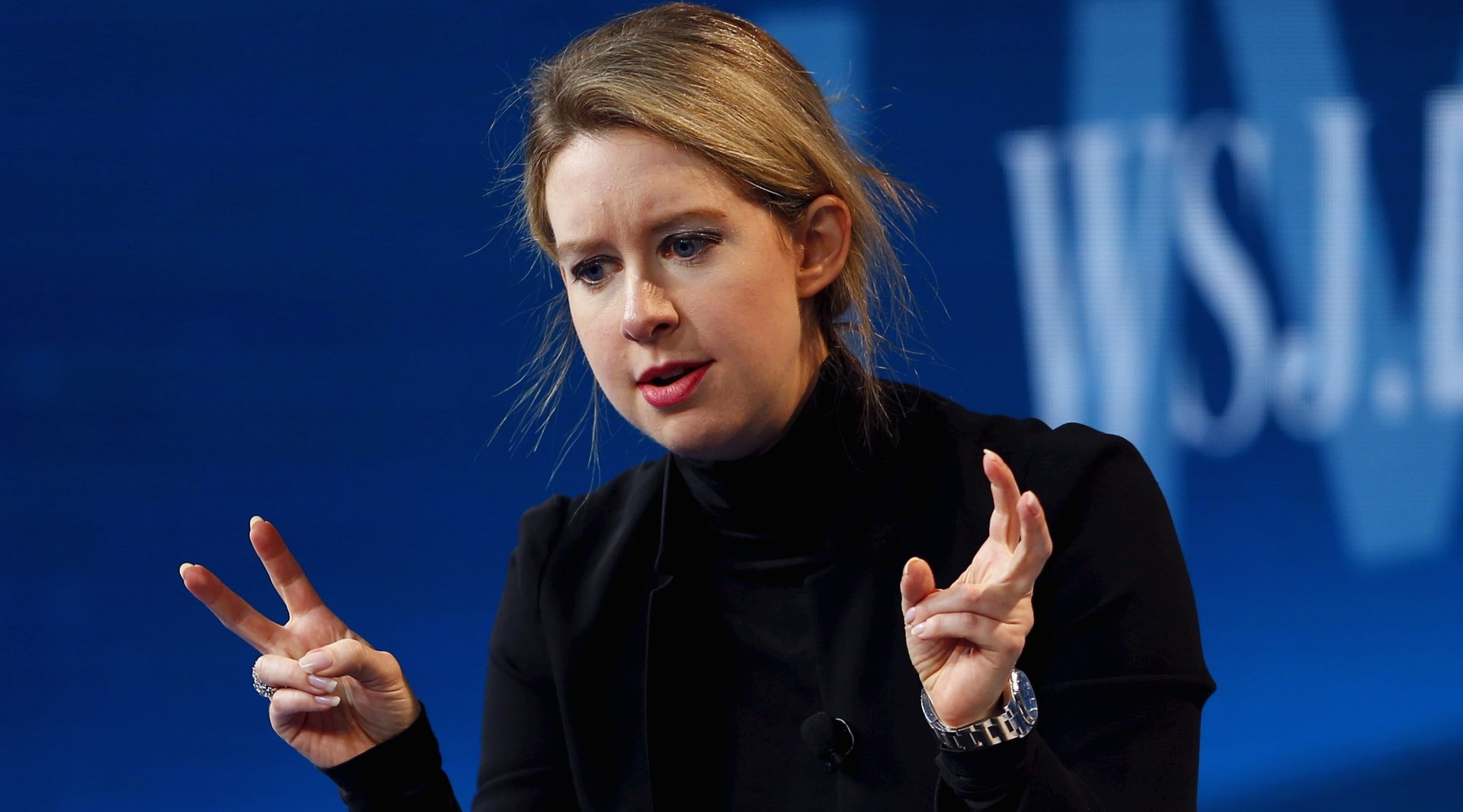Only in Silicon Valley could Elizabeth Holmes lose $4.5 billion she never had to begin with
America’s richest self-made woman is broke. On June 1, Forbes went viral when it downgraded its estimation of Elizabeth Holmes’ wealth from $4.5 billion to zero. The magazine argued that Theranos, the embattled biotech company Holmes founded, should no longer be valued at $9 billion. Therano’s new valuation of $800 million meant Holmes’ 50% common stock stake is now worth next to nothing; paying all of Holmes’ investors who own preferred stock first would leave a very small piece of the piece left for Holmes herself.


America’s richest self-made woman is broke. On June 1, Forbes went viral when it downgraded its estimation of Elizabeth Holmes’ wealth from $4.5 billion to zero. The magazine argued that Theranos, the embattled biotech company Holmes founded, should no longer be valued at $9 billion. Therano’s new valuation of $800 million meant Holmes’ 50% common stock stake is now worth next to nothing; paying all of Holmes’ investors who own preferred stock first would leave a very small piece of the piece left for Holmes herself.
The Forbes news was internet gold. But while it makes for a compelling headline, it’s not quite true that Holmes “lost” $4.5 billion—in fact, she never had that fortune to begin with. Instead, she had shares in a company somebody decided was worth that much. This is telling of a broader issue affecting Silicon Valley and beyond: Society has become accustomed to using a single number to describe personal wealth and start-up valuation. But net worth is actually a terrible metric of wealth—it serves primarily to mislead the public and create media headlines. By perpetuating to the myth making that so often surrounds start-up founders, this type of economic hyperbole contributes to the ever-ballooning Silicon Valley bubble.
The rich aren’t liquid
Billionaires store very little of their net worth in cash or Swiss bank accounts. Often, most of their assets are tied up in ownership stakes in companies. This is a relatively small distinction when it comes to publicly traded companies—if Zuckerberg really wanted to sell all his shares in Facebook over a prolonged period, he could probably do so, although he’d have to do so at a loss and only after clearing the sale with the SEC. In Holmes’ case, however, her “wealth” could not be liquidated, because there isn’t an open market for shares in private companies.
Illiquid assets might technically have similar “value” to liquid ones, but they aren’t necessarily comparable. By definition, illiquid assets can’t be converted to liquid cash, and thus can’t be used in an exchange. A million dollars invested in a startup is not the same thing as a million dollars in cash; only one of those sums can be used to buy a Ferrari. This leads to so called “paper billionaires,” people who don’t have the purchasing power we’d associate with their wealth.
Startups are systematically overvalued
A related problem is the way startups are valued. Theranos wasn’t valued at $9 billion because it was bringing in massive amounts of revenue or held vast assets. Rather, venture capitalists valued the biotech company so highly because it had the potential to be worth that, or more. It held $9 billion of expectations. Obviously, this is not the same thing as cash. When an investigation concluded Theranos’ inventions were unlikely to ever become profitable—or even workable—all of those expectations evaporated, and the valuation collapsed accordingly.
This is well established—venture funds buy into companies for preferred stock, not common stock, and so employees’ common stock is not the worth as much. You can think of these as two different classes of stock as having two different priorities—investors always get paid before employees and founders. However, it’s worth noting that Forbes’ initial valuation of Theranos conveniently ignored the difference between preferred and common stock. Holmes’ 50% stake was valued as if all investors were holding common stock at the $9 billion valuation, which is untrue. Instead, the holding of preferred shares that valued the company at $9 billion implies that common shares were valued at a lower price. So in fact, Holmes’s stake was never worth $4.5 billion.
The crux of the problem is that it’s very hard to describe wealth as a single number. Humans are very attached to rankings—we want to know if Bill Gates is richer than Warren Buffett, whether Apple is bigger than Google. Unfortunately, the answer is often more complicated and requires more space to explain than a typical magazine cover listicle allows for.
The extremely wealthy derive their worth from a complicated array of holdings and instruments that pay out in weird ways. These instruments often don’t convert perfectly to cash or each other, which makes a strict ordering on wealth incredibly difficult. “Net worth,” it turns out, is a vanity metric we use to simplify the complex; it is not an accurate representation of value.